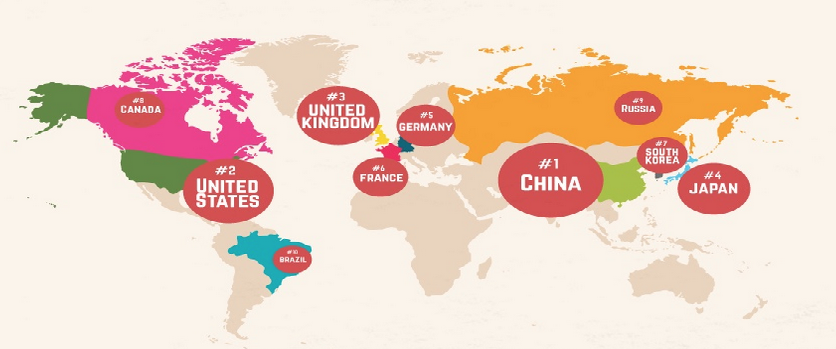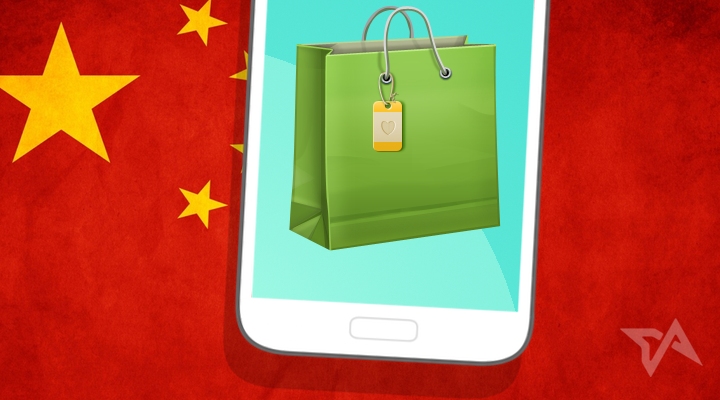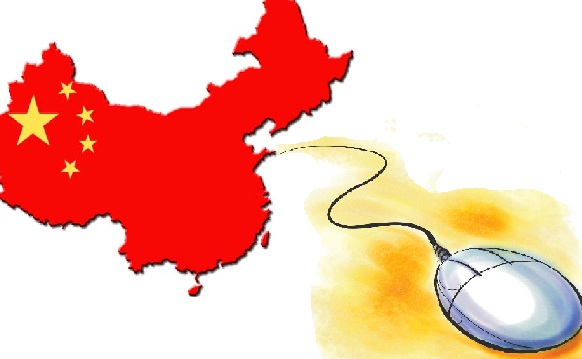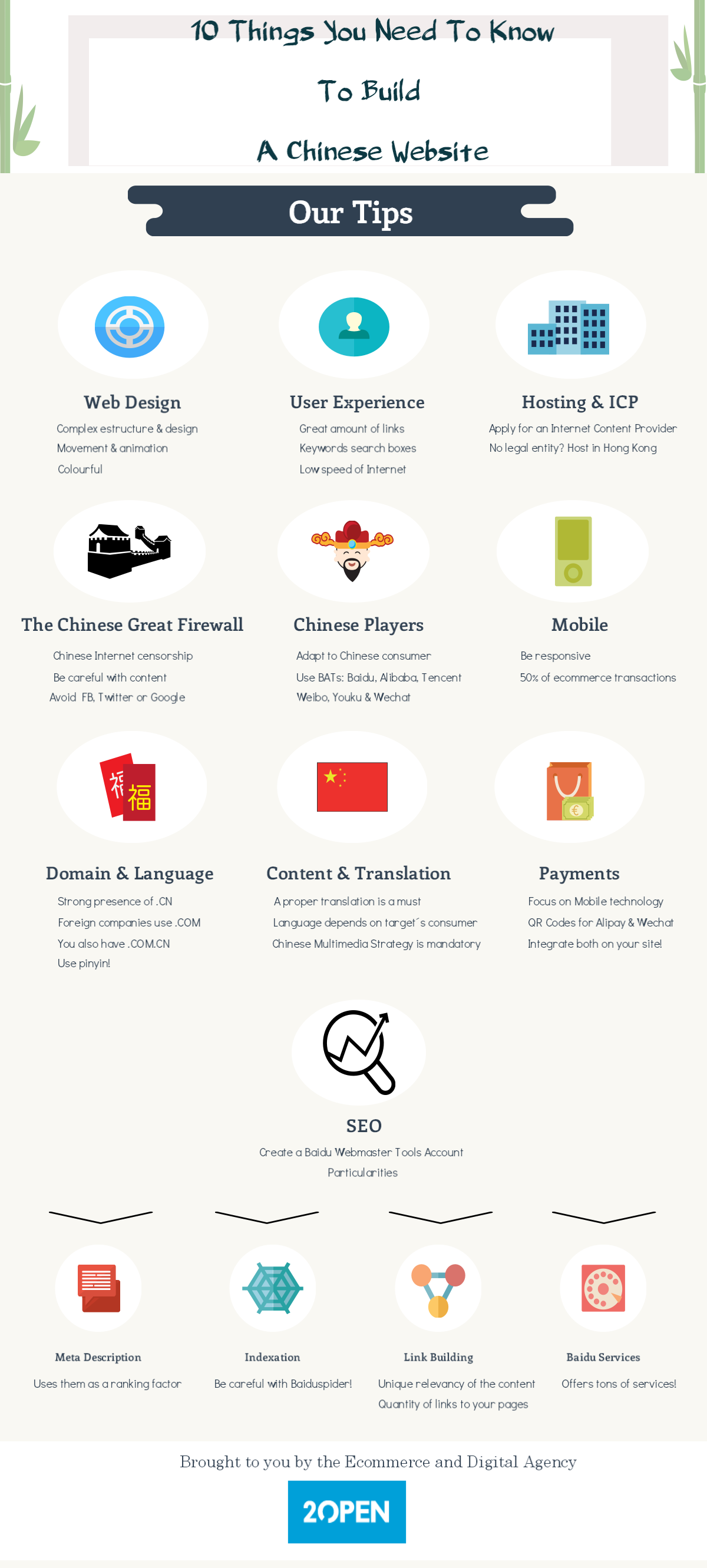5 Bugs To Avoid When Doing E-Commerce In China
Have you ever tried to build a new overseas brand and fail in your attempt? In any approach to China, foreign brands often make some common mistakes when trying to sell their products in China mainland. Although such misconceptions are not exclusive to online environment, we will focus on those that particularly affect your approach to e-commerce in China. China is already the world’s first e-commerce market.
Are you going to miss its enormous potential?

First bug: China is mobile, and you better record it
It is not the first time we tell you this, and for sure it won´t be the last. As we mention before in our article “How to Take Advantage of the Latest Ecommerce Revolution?”, Ecommerce has been a great revolution for both companies and customers.
Nowadays, Chinese prefer to use their mobile devices rather than their laptops and according to the new trend, companies have already starting to adapt themselves to portable devices. Moreover, those companies using U-commerce are focused on improving the customer experience through customizing and navigation created in cooperation with the User.

Second bug: E-commerce may be an asset in your country, but in China is irreplaceable
We cannot fail to mention Frank Lavin, CEO of Export Now, when he says,
“In China, Ecommerce is the cake.”
This may mean that you will need to adapt your business to the new environment. Do not expect it to be China who suits you, this does not work this way.
Remember that whoever hits first, hits twice. Embrace e-commerce as the enabler of your business it is, and take advantage of the immense benefits that electronic commerce can bring to your company to start selling around the World!

Third bug: Social Media is there to stay. Register your account and start moving!
Surely you’ve never heard the words Baidu, WeChat and Weibo… and let us tell you that you have a huge problem in China.
Not only around the 93% of the online searches in China are done in their own search engines –Have you ever heard Google does not work in China?– but also about a 68% of the customers take a look on the official Social Media account before buying.
Do not miss the opportunity to have a voice in that huge chicken coop is the network, start developing a tailored communication strategy for your brand and gain your piece of the cake!

Fourth bug: Domestic and lazy thinkers, or how the triumph from a day doesn’t make it daily
Do you think you will keep doing in China pretty much the same things you were doing before and as a result you will achieve success?
A basic rule you should never forget again is, no matter the experience and the many different markets in which you have entered before, is that new horizons always implies a new starting on your understanding of the target, so we definitely encourage you to start a market analysis.
Will your brand be competitive in China?
Do you offer something different regarding your competitors?
Is there a suitable market niche in the country ?
These and a thousand more questions require a prior discussion, keeping in mind that China should not be underestimated: the country enjoys some peculiarities you definitely must know before starting your landing.
We strongly recommend you seek assistance from professionals focused on the Chinese market, in order to enhance your chances of success in the country.

Fifth buf: Do not try to do everything by yourself, ask for advice
We are not tired of saying it, and will do so again: China is not a flat road. Do not try to embark on this mission unaccompanied, but pick very well with whom.
Look for complementary partners interested in joining forces, go to Government agencies dedicated to external actions and internationalization and definitely search for specialized agencies in the country to start outsourcing some tasks.

Already in search of a consulting expert in digital marketing and e-commerce? You have come to the right place.

New Online Advertising Rules in China
New online advertising regulation in China will impact all digital business with presence in China. Here we bring you an analysis overview to start adapting to the new trend in advertisement.
It would be after the death of a college student who took part in an experimental health treatment found in Baidu, when popular pressure would force the Government to begin an ads regulatory change.
The Internet Ad Interim Measures, a new regulation prompted by the State Administration for Industry and Commerce of China, went into effect in September 1st. Therefore, it arises from the Government’s claim by adopt new rules over online advertisement: email, paid searches, embedded links, images, and videos are already subject to the new law. Its aim is avoiding the spread of misleading advertisements on the Net, and correct the prevailing liberality so far.
The new online advertising regulations are expected to impact on Chinese Digital Marketing as a whole: social media, search engines, apps and electronic commerce in the country will have to move under the new guidelines.
A step closer to the uses and customs in Western advertisements
For the first time in China, the new measure features a specific definition of Internet advertising; often, foreigners suffer from a lack of legislative safety in China. Therefore, conceptualization is a step forward to define clearly not only the concept, but also its extension:
“Internet advertising is advertisements that directly or indirectly sell commercial goods or services through the websites, web pages, internet applications and other forms of Internet media including text, images, audio, video and etc.”
Moreover, the regulation comes to underline its main purpose:
“To protect the legitimate rights and interests of consumers, and promote the healthy development of the Internet advertising industry.”

In what fields are these changes applicable? What changes will take place after its implementation?
The regulation is particularly focused on a list of fields described below:
-Healthcare and medicine
-Food and beverage
The main measures to be starting to apply can be summarized as:
–First, the Law requires to place the word “advertisement” in a prominent position and clearly distinguishable at first sight.
–Second, every field subject of special regulation needs a previous review and an approval process by authorities.
–Third, online advertisements for prescription medicine is banned. A special measure in health products is also extended to medicines, pesticides or medical supplies.
–Fourth, tobacco online ads are also banned.
–Fifth, any paid search results, links or content must be clearly identified by the word “advertisement”.
–Sixth, users should not only have the choice to close an ad, but also this has to be easy to them.
–Seventh, paid links and contents must be clearly detailed at a glance.
–Eighth, any attached ad and/or promotional links to an email should have been allowed previously.
–Ninth, any misleading and/or false ad is considered illegal from now on.
Who is especially affected by the new regulation?
Under this measure, the biggest impact falls on the largest Internet companies in China. Baidu and Bing should apply new restrictions on ads; it should not be forgotten that, much of the incomes of Baidu, Weibo or Alibaba come advertising.

But also traditional Social Media must change. WeChat or Weibo offer paid content; as we mention before, pop-ups, ads or links should be first permitted, which will force companies to evolve the way advertising is offered to Chinese users. Seems marketers should start creating better ads, or contravening the prevailing legislation with all the penalties that that means.
There are plenty of creative ways to sell your services and products in China. In search of a Digital Marketing Agency?
Infographic: 10 Things You Need To Know To Build a Chinese Website
A picture is worth a thousand words
After the great success achieved by our two articles 10 Things You Need To Know To Build a Chinese Website (I) (II), in the team we have thought it would be a good idea to summarize and turn them into an infographic.
We hope you enjoy it as much as we enjoyed its elaboration 🙂

Are you looking for a digital marketing and ecommerce agency?
Visit us. Let´s have a talk!
Is Sina Weibo On The Way Out?
There are plenty of Social Media platforms in China: while a few achieve great success, many succumb to a highly competitive scenario.
Result of its dynamism, it is essential to keep attention on the changes that China faces in the digital world.
From 2 Open, we have prepared a brief introduction about Weibo´s current situation.
Our goal is to give you some tips to fully understand what is going on with one of the biggest Chinese Social Media.
Do not hesitate to contact us for a more thorough analysis!
Weibo is a Social Media platform to produce, share and find out Chinese-language content.
As a leading platform, provides an easy way to express in real time and interact with people and corporations.
Its importance is not only due to its capacity to be an official/unofficial news source, but also because it allows people to express themselves in a public way.
The doomsayers come into the picture
Currently, Alibaba is the biggest Chinese e-commerce company: it provides C2C, B2C and B2B sales services via web portals, plus electronic payment services, a shopping search engine and data-centric cloud computing services.
Three years ago, Alibaba bought 18% stock of Weibo. Since then, several media have speculated that Weibo or even Sina might be acquired by Alibaba in a short time.
Encouraged by the rise of Wechat, many marketers have predicted the fall of Weibo. Well, the latest Earnings report proves they were wrong.

Is Weibo on the way out? Let the Earnings speak the truth
According to official Earnings Report of 2016 Q2 from Sina Weibo, the Net profit of 25.9 million dollars (net revenues of $ 146.9 million) increased 516% compared to the same period last year.
Moreover, Weibo 2016 Q2 data shows the Total revenue of Weibo is 146.9 million, including 127.2 million revenue from Advertising business, value-added services $ 19.7 million for value-added services.

Let’s review the users’ data on Weibo now
Monthly Active Users –MAU- is 282 million, increase 33% compared to the same period of last year. In addition, Daily Active Users –DAU- is 126 million with 36% increase compared to same period of last year.
Is noteworthy that 89% of them are mobile users.
The progress is closely related to their own media advantage
Three years ago, relying on its social communication advantages, Weibo attracted $ 600 million of Alibaba, while became an effective channel for celebrity campaigns, events, marketing and other commercial activities.
After that, Weibo focused on the advertising model. At the end, it decided to put aside Alibaba and manage the business alone.
In 2016 Q1, advertising investment from small and medium enterprises increased 147%. The quantity of SME’s and self-service advertisers reached 830K with 25% increase compared to previous quarter.
In 2016 Q1, investment in small and medium advertising revenue grew 147%, the number of SMEs and self-service advertisers reached 830,000 and a 25% increase the previous quarter.
Why both SMEs and big brands value Weibo a lot?
Both leverage it as an important channel frequently, specially because:
- Increase of traffic and users with 282 million MAU
- Optimized Algorithm of Ad Platform
- Active Internet Celebrities
- Live-streaming
The outbreak of short videos
We should add that speaking of its development path, the outbreak of short videos is also a milestone of growth of Weibo.
According to the 2016 Q2 Earning report, the playback amount of short videos on Weibo has increased 200%.
Meanwhile, the Internet celebrity economy is rapidly booming. Based on short videos, live-streaming broadcast and e-commerce, Weibo occupies the core position of social media with its incredible social power.
Margin improvement for future
The operating leverage will keep being prominent in the future. Based on the non-GAAP, the operating Margin rate of Weibo was 23.6% in the second quarter.
It is expected that the Weibo´s operating Margin rate could reach 25.2% in the third quarter, 23.4% in 2016 financial year, and 28.7% in 2017 financial year.
After seven years, Weibo proves to the world its strength and influence.
Do you still think Weibo is on the way out?
Our Digital Marketing and Ecommerce Agency have the experience of a team dedicated to know in depth the Chinese Social Media.
If you are looking to push your sales in China, do not hesitate to contact us.
Moreover, if you are interested in receiving to your mail the latest trends of Chinese Social Media, please suscribe to our monthly Newsletter!
This article has been edited by Paula Vicuña, from 2 Open.
Networking in China: Guanxi for Business
Have you ever heard about Guanxi?
This post seeks to provide practical guidelines to Companies on how to handle business interaction between Chinese and Foreign parties to ensure business agreements.
While doing a Market Research, Companies should be aware of some of the basic particularities which can condition their success or failure.
To develop an appropriate strategy of internationalization, it would be necessary to analyze some of the key-factors which can be decisive. Due to deep social differences among East and West, in China the importance of personal connections is crucial.
Major differences in negotiating with Chinese firms face many challenges which can eventually destroy a future profitable relationship.
Throughout this article we will make special mention of the term Guanxi.
Guanxi is essential for successfully doing business in China. The term is used to refer to a mutual trust between both parties, based on a long-lasting and reciprocal personal relationship.

Guanxi connections in China
There are some Chinese thinking patterns you should take into consideration before starting your business in the country:
- The importance of interpersonal relationships in business, terms specially related to hierarchy and reciprocity concepts.
- The effectiveness of moral over legal practices
- Prestige and public standing to guarantee the Face
In your approach to establish a networking, patience will be required in all the stages: to generate trust, to select the accurate network and to invest in a lasting relationship.
Why is Guanxi so important?
In China, economy is still strongly based on relationships. Trust remains the basis for economic transactions between Chinese people.
Therefore, Guanxi is a particularly valuable resource and becomes an essential facilitator of trade and economic transactions.
Three are the cornerstones on which to build Guanxi:
- A common social identity
- The existence of a third party in common
- A common aspiration of collaboration to create the potential bases for relationship
Chinese people do not show loyalty to the company, but to their personal relations
Networking can make the difference: eventually, right relationships will move your business faster in future.
But Guanxi also implies more traditional concepts to put it in practice:
- Mianzi: The care of positive prior appearances
- Renqing: Reciprocal favors as a moral obligation
- Ganqing: Emotional and enduring commitments that comes from the intimate social ties
The importance of an intermediary as a business enabler
Usually called Zhongjian Ren, the Intermediary deals with both parties to settle the differences in order to achieve a better solution to each problem.
Because Companies with best Guanxi win, having a proper Intermediary to represent your company can facilitate the business dealing and establish a successful business in Chinese market.
In search of Guanxi experience?
In 2 Open, we have the expertise you need to boost your Company to take advantage of the Asian market.
How to Acquire Chinese Tourists through Digital Marketing
It is almost August and tourists are everywhere. From 2 OPEN we are pleased to give you some basic steps to acquire Chinese Tourists through Digital Marketing.
Since 2013, the number of Chinese outbound travel population and tourism consumption both already ranked the world’s first.
In the next few years, Chinese outbound tourism consumption market will continue to maintain high growth speed: 174 million Chinese people will choose to travel abroad, and the amount of consumption will be around 264 billion US dollars in the year 2019 by estimation.
Chinese tourists has become the “cash cow” of global travel industry
This prosperity is due to the increase of urban population and disposable income, the rise of the middle class, RMB appreciation, the gradually liberal visa policy and the increase of international flight routes have given rise to the empowerment of as a yet undeveloped sector.
What kind of travel products do Chinese tourist usually choose when travelling?
When travelling, Chinese tourists mainly choose to travel with tour guide, both group package and/or flight + hotel. Even if travelling without guidance is still scarcely used, it is a fast leading trend and a great opportunity of future.
Which Channels do Chinese tourism use to purchase travel products?
Even if traditional travel agencies are still the most popular, every day more Chinese opt to book though Online travel agencies, such as Ctrip and Qunar. It is highly likely that its importance grow each year.
How Chinese travelers spread their feeling about their country-destination?
The consumption of Social Networks in China is massive. Either through posts or instant messaging, the power of “Word of Mouth” is overwhelming.
Wechat and Weibo play a very important role in choosing destinations for Chinese people.
From 2 Open, we suggest you paying attention to online platforms in any plan to approach the Chinese market.
Which channels do Chinese people use to search touristic-information?
Either through an Agency´s Website or through Social Media, Chinese travelers love using new technologies to discover places, compare tariffs and share their experiences abroad.
Once again, the power of the main Social Media Platforms in China –Wechat and Weibo– is increasing each year.
What do Chinese travelers suggest for information channel?
The most expected information search channel for Chinese travelers is to set up Chinese official website, followed by WeChat and Weibo Chinese accounts set-up.
So, What can you do to attract more potential Chinese tourist to your destination?

From 2 OPEN we suggest you some ideas before starting your approach to China:
- Build a Website:
To set up a Chinese Website, this must be hosted in China (-cn domain). It would be necessary to make it consistent with Chinese search engine´s standards and be entirely written in Mandarin.
From 2 OPEN we strongly suggest you to take advantage of new technologies –Big Data- to improve the user experience and target the right audience.
- Search and Display Marketing:
Baidu, the biggest Chinese search engine, is essential on any approach to Chinese digital market. Your site should be well-ranged on Baidu´s search engine to let Chinese tourist find you.
In 2 OPEN we have the expertise to deal with SEO or SEM campaigns, in order to help you to gain visibility and target potential customers.
- Social Media:
Social networks are the most used channels in China. Try to attract users to your official accounts –WeChat and Weibo– by posting travel news and proposals to people. Start your Social Media plan with our help!
- Key Opinion Leader:
To build a proper networking with Key Opinion Leaders on Social Networks can make the difference in China, and they are a very effective way to promote products and services.
- Cooperate with a third-party agency:
Online Travel Agencies -like Ctrip– provide a package of services include tickets, hotel, tourism products and car rental etc. Cooperate with them will bring you huge traffic and a great chance to sell. In addition, Online Travel Agencies let customers interact each other about trips, top destinations and advices.
From 2 Open, we encourage you to take an advantage of their social marketing impact by improving your content marketing.
- O2O:
In last year, China tourism O2O industry achieved great improvement. The relationship between resources and platforms become closer under the impetus of capital. Wheather through Online platform + offline resource or Online channel + offline channel, both can make the difference.
- Offline Event and Public Relations:
Traditional offline advertisement promotion can be useful in China, but very expensive. Combine Online and Offline Marketing can be the top-solution for your company.
We hope this information has been valuable and helpful to you, and we encourage you to start your approach to the huge Chinese tourism market. With our help, your company could take the great advantage online marketing offers!
Have a look to our services!
This article was edited by Paula Vicuña, from 2 OPEN.
The Great Firewall: a barrier for foreigners who live in China
China is a very attractive country, rich in culture and full of traditions that appeal to most foreigners, it is also a place that offers considerable rewards for those who are seeking business opportunities. Despite its attractiveness there are some cultural barriers every foreigner has to overcome if they are planning to live in China, and these could sometimes turn out to be quite exasperating. In order to get a regular life in China, a “lǎowài” (老外term used by Chinese to refer to foreigners) has a few things to keep in mind, visas, language food and the business cultural differences, etc.
Apart from these issues, one of the greatest problems “lǎowài” face is Internet censorship. In this country there is a great firewall that blocks many foreign websites. In theory, this firewall was created with the objective of avoiding citizens’ protests against government and thereby they can filter all the content that is not suitable for the government’s interests, in a way they are trying to protect their citizens from unsuitable foreign media. Many of the websites with the highest traffic from the rest of the world cannot be accessed from the people’s republic of China. Webpages like: Google, Facebook, Twitter, Instagram among many others are not accessible with a conventional connection.
Some of these webpages have their own Chinese versions and are used by the Chinese community. Even though they do not have exactly the same functionalities and characteristics, here are some of the most famous ones with their Chinese counterparts, of course there are many more examples, but could be considered the most important ones:
| Youtube |
Youku
|
Twitter |
Weibo
|
Facebook |
Renren
|
Google |
Baidu
|
Ebay |
Alibaba /Taobao /Taobao
|
Amazon |
JD.com
|
It is practically unthinkable for a “lǎowài” to have to leave all the social networks and other webpages that he/she has been using for years and start using the Chinese versions. Luckily, there is one option in order to access to all the forbidden pages, without having to travel outside of Mainland China. The solution is a VPN (Virtual Private Network), which allows you to connect virtually to another network, in other words, when you connect using a VPN you are basically borrowing a server from another country, which tricks your computer into thinking it is located in that other country. As you do not seem to be connected from inside Mainland China, there is no firewall that prevents you to connect to all the desired webpages.
It is worth noticing to which country you are connecting to due to own governmental regulations, some countries also have restrictions that vary from blocked webpages to available downloadable content. Nowadays there are many companies offering VPN services. Here is a comparison between the most used providers in the market:
|
Astril |
PureVPN |
ExpressVPN |
VyprVPN |
|
| Speed |
Very Fast |
Fast |
Fast |
Fast |
| Price per year |
$69.95 |
$49.92 |
$99.84 |
$89.16/$106.92 |
| Simultaneous connections |
2 |
5 |
2 |
2/3 |
| Free trial |
7 days |
3 days |
30 days |
3 days |
| Servers |
280 |
500 |
100 |
700 |
| Supports |
Mac Os / iOS / Windows / Android / Linux |
|||
The great firewall is updated regularly, so there might be unable webpages one day that were working perfectly on the previous day. This is a reason for the VPN providers to stay on alert to those changes from the Chinese government. These are not the only VPN out there, there are a lot more VPN providers on the web, in case you feel adventurous. Lastly we would also advice you to respect governmental laws and regulations and also try the Chinese versions of your favorite app, and/or websites, who knows, you might end up liking it better.
This Article was edited by Andres Arroyo Olson from 2Open.
https://www.purevpn.com/order/
https://www.expressvpn.com/es/order
https://www.goldenfrog.com/ES/vyprvpn
http://startuplivingchina.com/best-vpn-for-china/
http://www.saporedicina.com/english/vpn-how-to-access-facebook-in-china/
http://blogthinkbig.com/que-es-un-vpn













